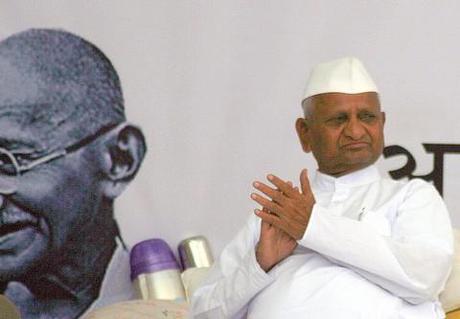
Anna Hazare: Gandhian? Photocredit: http://www.flickr.com/photos/ramesh_lalwani/5597837277/sizes/m/in/photostream/
India has suffered a wave of corruption scandals in the past few months, which have led to protests against the administration of Prime Minister Manmohan Singh. The scandals included a Wikileaks cable showing alleged vote-bribing; the anti-corruption chief himself charged with corruption; and the Telecommunications Minister accused of mis-selling mobile phone frequency licences. An anti-corruption bill (the Jan Lokpal Bill) is being introduced by the government: but many say it is not enough.
Anna Hazare (reported variously as 73 or 74) is leading the protests against corruption. In particular he wants amendments to the Jan Lokpal Bill, because the government’s version allows the prime minister and senior judges to escape scrutiny. He was going to “fast unto death” (along with at least 1,200 supporters), and was held in custody in Delhi because of this. His detention on 16th August sparked massive protests across India.
Police had previously offered him three days for a proposed hunger strike, which he refused. He has now agreed to an offer which will allow him to go on hunger strike for fifteen days. The Prime Minister has called the hunger strike “totally misconceived”, but has been jeered by opposition MPs. The protests are a matter of extreme concern for the government.
The Daily Telegraph reported that opposition MP Maneka Gandhi is saying that Singh is making “a mockery of democracy.” The Indian Express said that America has denied being involved in the protests, and The Times of India claimed support for Hazare was growing.
- India’s soul in turmoil. Dinesh Sharma in Asia Times Online said that this “grassroots movement” is propelled by the “fears, hopes and aspirations of a people staring into their global future.” This crisis is about “the soul of India and the rising conscience of a nation.” The promises made by Jawaharlal Nehur, the first Indian prime minister, “remain woefully unrealized.” Hazare (a Gandhian, who has been given awards by the government for his work) has initiated a “satyagraha” (“resistance to tyranny through mass civil disobedience”). He calls it “the second call for independence”, asking what has India gained in 65 years? India’s new wealth has engendered “a disorientation of deeply cherished Indian values,” tailed by corruption and economic disparity. India faces a “Faustian bargain” – commerce, or culture. Anna Hazare is “showing a path out the quagmire.”
“The colonial white rulers, the firangees, have left the country, but now we are beholden to the new brown oligarchs who are looting the country and lining their off-shore accounts,” said Anna Hazare.
- Jan Lokpal isn’t the answer. The government made a mistake in arresting Hazare, Mahesh Bhatt told Priyanka Jain in The Hindustan Times – even though the bill he wants to introduce is “as dangerous, impractical and unworkable as the one the government has created.” It’s naive to believe that with the Jan Lokpal bill corruption will be rooted out. Instead, we should “identify levels of accountability within the state and assign responsibility for fighting corruption at each of these levels.” We need an act to protect whistle blowers. Anna’s bill “will take away power from the people.” Corruption is a major issue, and while “there is a place for people like Anna,” we should “back the cause and not necessarily the person.”
- An incorruptible. The Washington Post delved into Hazare’s background: he was in the army for 15 years, and received inspiration from the nineteenth century Swami Vivekananda. After narrowly escaping a Pakistani air attack, he dedicated himself to public service. He transformed his village into a “model” through sustainable farming. He lives on his army pension in a temple, and always wears white clothes with “a traditional Indian cap.” His nationalism, integrity and honesty have endeared him to the growing Indian middle class, but critics claim “he is using anti-democratic methods of moral coercion to force his will on the elected government.”
- Think hard about what we’re doing. Mihir Sharma in The Indian Express said that the middle classes “dream of the barricades.” It’s a pity that this movement is ”in the service of a useless, misguided bill, and coalescing around a man whose ideas are regressive and authoritarian.” We see Hazare as a “plucky Gandhian crusader”, when actually he is anything but. The middle classes are expecting special treatment for the protests against this bill – but when was the last time such a long protest was allowed? The middle classes, who wrinkle their noses at slums, want structures bent for them. Sure, they shouldn’t be “apathetic. But this is not an engagement with Indian politics; it’s an attempt to reassert control over it. The Jan Lokpal bill embodies that impulse, imagining a schoolmasterly figure who would restrain the wild, selfish impulses of the chaps the proles see fit to elect.” Let’s think hard about what rights the middle classes are screaming for.

